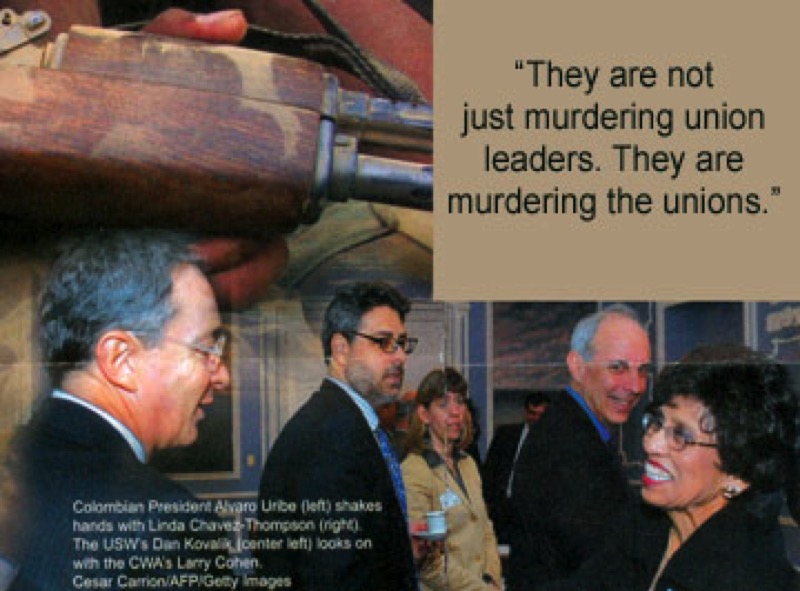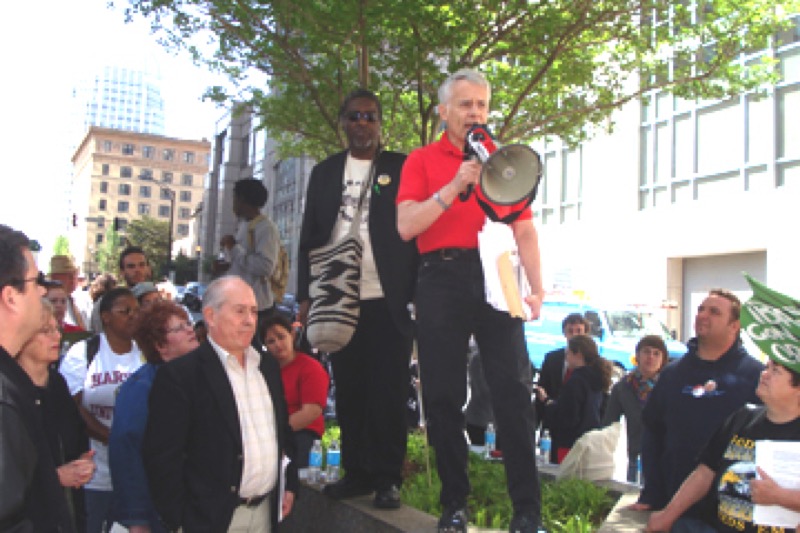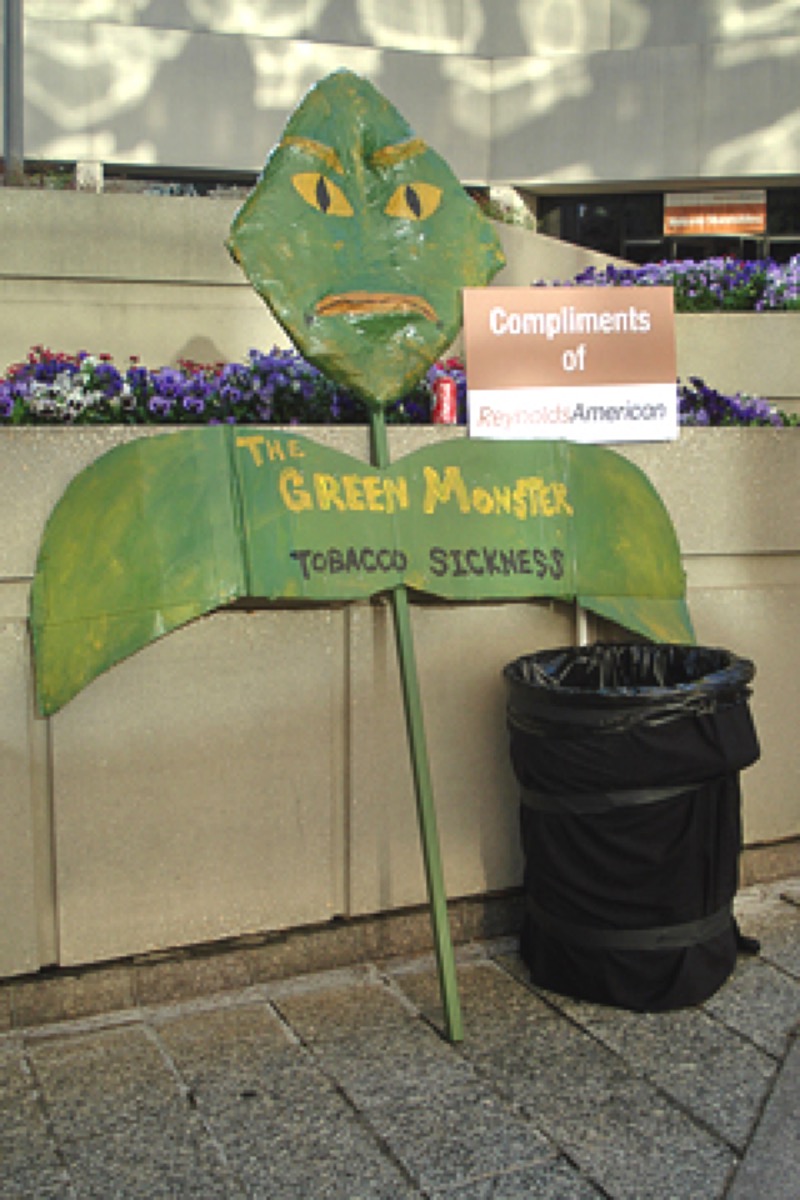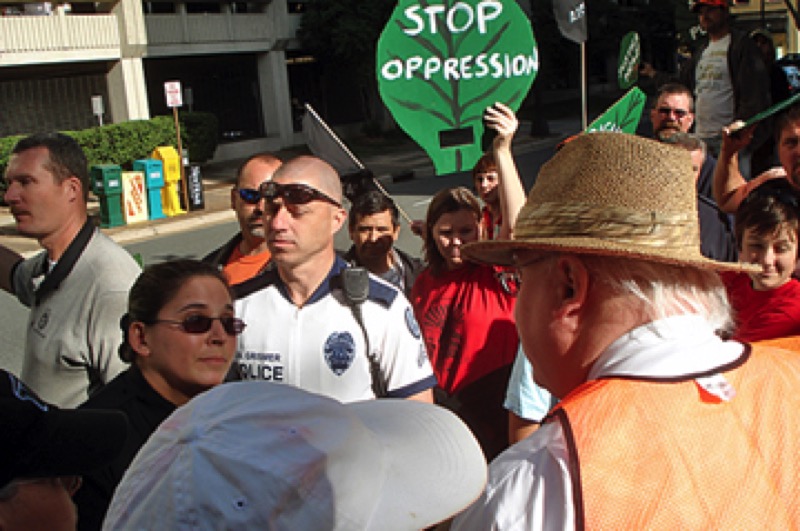Killer Coke Update | June 18, 2008
Is Coke trying to cover up deadly accidents in its system?
- Is Coke trying to cover up deadly accidents in its system?
- New legal challenge to Coca-Cola details Miami court's "Reign of Error"
- Summary of 2008 Complaint: SINALTRAINAL vs. The Coca-Cola Co.
- SINALTRAINAL et al, v. The Coca-Cola Company, et al., March 31, 2008
- Beneath Judicial Robes: Martinez's Bias Becomes Clearer
- Martinez in Broadcast booth, The Florida Bar News
- June 8 statement by Attorney John Cavicchi re: Judge Martinez & conflicts of interest
- 60 Minutes appearance by Terry Collingsworth, co-counsel in lawsuits vs. Coke
- St. Joseph's University at least 49th college to dump Coke
- Southern Maine Labor Council, AFL-CIO, calls on affiliates to stop purchasing and to remove Coke products from facilities
- OPSEU, Canada's largest provincial union, votes to boycott all Coca-Cola products
- Coke IS a serious health risk!
- Ex-Coke workers shut down Coke operations in Venezuela
- Coke and the Colombian Free-Trade Agreement
- Stop Killer Coke supports Farmworkers campaign against R.J. Reynolds
- Promoting the Big Lie video - The scandalous relationship of Ed Potter, Coke & the ILO
- New book: 'We Will Be Heard: Voices in the Struggle for Constitutional Rights'
1. Is Coke trying to cover up deadly accidents in its system?
a. Tanzania Accident Kills 10 Children
Because of the serious nature of the allegations cited in the following anonymous letter, Campaign Director Ray Rogers called the contact number on the accident report accompanying the letter. Ray talked to a Coke spokesperson who repeatedly stated: "I cannot talk to you about this. I will have someone from the communications department call you." That was in April 2008. No one has ever called back.
Read the Accident Report
We are asking anyone with information about serious accidents at Coke facilities to contact us with documentation:
Campaign to Stop Killer Coke
Cooper Station, PO Box 1002
New York, NY 10276-1002
info@KillerCoke.org
(718) 852-2808
Anonymous Letter to Campaign Director Ray Rogers Re: Tanzania
"Dear Ray:
"The attached is an internal accident report from Coke. This accident took place less than a year ago in rural Tanzania and killed many school children. There was no mention of this in the media because Coke successfully stifled it locally. Such accidents are very common in the Coke business. This is one of many fatality reports. They do not hold themselves or their franchises accountable. They believe that this is a necessary cost in doing business. You will not be able to get their safety data & because they do not report it externally. Believe me, it is one of the worst for a company of its size. Many of their franchises and operations do not even record safety data. Employee and contractor fatalities are very common and frequent in Coke's business & especially in the Third World. The management is deliberately turning a blind eye to this. They do not want to deal with an issue that will make them look negative. Something has to be done. I am sending this to you because I know that you are the only one who can help.
"Very concerned"
b. Poland Accident: from pracownik.net, 2/26/08
Two Workers Die at Coca Cola Plant Near Warsaw
"Two workers were killed by a toxic substance Feb.22 at the Coca Cola plant in Radzymin, near Warsaw. The workers were from a firm which was called in to repair a vat at the factory. Three workers became ill from the toxic substance which may have been at the bottom of the vat. All three workers lost consciousness.
"The fire brigade was called and the men were taken to the hospital. 27 year old Rafał T. was pronounced dead on arrival. 28 year old Krzystof B. died a couple of days later. The third victim was hospitalized and survived."
c. Nigerian Tribune, May 1, 2008 '3 Killed as Coca-Cola Plant explodes in Edo [Nigeria]'
"Nigerian Tribune learnt that the plant would have been saved the extensive damage if the passersby and villagers, who rushed to the place on a rescue mission, had gained access to the complex. The main gate was reportedly locked and this was said to have prevented people outside from gaining entry."
2. New legal challenge to Coca-Cola details Miami court's "Reign of Error"
a. Summary of 2008 Complaint: SINALTRAINAL vs. The Coca-Cola Co.
NEW LEGAL CHALLENGE TO COCA-COLA DETAILS MIAMI COURT'S 'REIGN OF ERROR'
The legal team representing Colombian union members who were targeted and victimized as a result of Coca-Cola's collaboration with paramilitaries and other lawless elements has renewed its effort to secure justice in an appeal to the U.S. District Court for the Southern District of Florida.
In a 64-page opening brief filed with the court in Miami on March 31, 2008, the lawyers asked for a reversal of previous orders dismissing the Atlanta-based Coca-Cola Company and related defendants in the United States and Colombia that were originally sued in 2001.
The appeal involves four consolidated cases brought under U.S. laws (the Alien Tort Claims Act and the Torture Victims Protection Act) that prohibit torture, murder and other human rights violations.
The plaintiffs allege that Coke's Colombian bottlers "collaborated with the paramilitary forces who murdered and tortured" leaders of the SINALTRAINAL union. The Coca-Cola Company and its subsidiary, Coca-Cola Colombia, were also named as defendants "due to their overall control of the Colombian bottling operations."
In 2003, District Judge Jose E. Martinez dismissed the Company and its subsidiary as defendants on the questionable grounds that "Coca-Cola lacked sufficient control over its co-defendant bottlers to be vicariously liable." This finding, based solely on review of a sample bottlers' agreement submitted by Coca-Cola, made it impossible for the plaintiffs to provide "any competing evidence on the factual issue of control." Judge Martinez also "ignored that Coca-Cola need not have actual 'control' over its bottlers to be held liable for its bottlers' conduct," according to the new legal brief.
However, in the same decision, Judge Martinez declined to dismiss the remaining defendants, holding that it wasn't necessary to show that Colombian state authorities were involved because the violations were committed during the course of an armed, civil conflict in Colombia, and were thus actionable as "war crimes." With respect to claims requiring "state action," the court held that plaintiffs properly alleged that defendants acted jointly with paramilitary forces entwined with the Colombian government.
Three years later, in 2006, the court issued another order under the guise of "clarifying" its position. "This ruling dismissed the remaining defendants based on the failure to allege 'state action,' despite the earlier ruling to the contrary," the new brief noted.
The complete text of the new brief, alleging several additional "legal errors" and "inconsistent positions," can be found at by clicking here. Of particular interest is the detailed account, based on eyewitnesses, of how union leader Isidro Segundo Gil was murdered inside his workplace by the notoriously brutal United Self Defense Forces of Colombia (AUC), which the U.S. State Department has designated a terrorist organization. Both the 1996 murder of Gil and the 2002 murder of another union leader, Adolfo de Jesus Munera, which is the focus of a lawsuit filed in 2006 against Coca-Cola and its largest Colombian bottler, could not have occurred had not Coca-Cola managers collaborated with the killers and established a pattern of allowing them access to the bottling plants.
b. SINALTRAINAL et al, v. The Coca-Cola Company, et al., March 31, 2008
View Plaintiffs' Opening Brief
c. Beneath Judicial Robes, Martinez's Bias Becomes Clearer
In January 2007, the Campaign to Stop Killer Coke revealed that Judge Jose E. Martinez's ties to the University of Miami Athletic Department (which is heavily subsidized by Coca-Cola) and his old private law firm raised serious questions about possible conflicts of interest. The Campaign called upon Judge Martinez to recuse (remove) himself from the cases involving Coca-Cola's conduct in Colombia.
"The new legal initiative against Coke, with its extensive citation of Judge Martinez's numerous errors and inconsistencies, illuminates his biased attitude," said Campaign director Ray Rogers. (For more about this aspect of the Coke-in-Colombia issue, go to point 3 of "Critical Talking Points.)
"It's hardly a coincidence that another large multinational corporation, Chiquita Brands International Inc., pleaded guilty in March 2007 to paying $1.7 million from 1997 to 2004 to the right-wing terrorists from AUC and agreed to pay $25 million in fines," Rogers added. "As a Colombian labor official, Francisco Ramirez, said to USA Today (10/30/07), 'To us, it's very clear that every international company in this country is paying the paramilitaries for protection.'"
d. Article: Martinez in Broadcast booth, Dec. 15, 2007, The Florida Bar News
"[W]hile still a lawyer, Martinez was part of a group that bought the Spanish language radio rights to UM football and soon after expanded into broadcasting UM basketball and baseball games as well."
e. June 8 statement by Attorney John Cavicchi re: Judge Martinez & conflicts of interest
"?Judge Martinez broadcasts baseball, football and basketball games for the University of Miami. Judge Martinez did not disclose to labor union lawyers suing Coca-Cola that Coke sponsors the University of Miami sports website. Neither did he disclose his former law firm's association with Coke. While Colombian Coke workers were tortured, kidnapped or illegally detained, the judge sat in the broadcast booth for nearly four years before finally deciding in Coke's favor? A Eucharistic minister, he threw out a jury verdict against the Catholic archdiocese in a child abuse case, but did not disclose his association to lawyers suing the archdiocese?"
Click here read the full Cavicchi statement.
f. 60 Minutes appearance by Terry Collingsworth, co-counsel in lawsuits vs. Coke
This 60 Minutes piece, although not about Coke, discusses the similar case of Chiquita Banana and its relations with paramilitaries in Colombia.

May 11, 2008, 60 Minutes: The Price of Bananas
(See Video)
Conde Nast Portfolio.com, "Peeling the Banana," May 13, 2008
USA Today, "Murder and payoffs taint business in Colombia, August 30, 2007
3. St. Joseph's University at least 49th college to dump Coke
Thanks to years of tough campaigning by Students for Workers' Rights at St. Joseph's University (Philadelphia, Pennsylvania), a Catholic and Jesuit institution with 7,300 students, there will no more Coca-Cola sold on campus.
Led by Bruce Thao, Colleen Klees and Mark Maher, all leaders of Students for Workers' Rights, students hosted a number of speakers, including Campaign Director Ray Rogers, organized a petition campaign against Coke products, held meetings with the university president, produced reports, distributed literature, spoke with Coke reps, introduced resolutions to the student senate and administration and showed a series of films exposing Coke, including "Mark Thomas on Coca-Cola."
Outgoing Students for Workers' Rights President Mark Maher wrote us: "Saint Joseph's University has officially ended its contract with Coca-Cola. There will be no more Coke on campus. As a graduating senior, leaving behind his coveted campus activism, this feels like a fitting way to bow out."
4. Southern Maine Labor Council, AFL-CIO, calls on affiliates to stop purchasing and to remove Coke products from facilities
The following resolution was passed at the June meeting of the Southern Maine Labor Council attended by dozens of delegates and Attorney General Steven Rowe of Maine. Southern Maine Labor Council, AFL-CIO President Peter Kellman handed out Campaign to Stop Killer Coke literature and explained to the delegates about the involvement of Coca-Cola bottlers in Colombia in the systematic intimidation, kidnapping, torture and murder of leaders of the Colombian union SINALTRAINAL.
"WHEREAS, Coca-Cola Bottling plants in Colombia routinely allow and encourage paramilitary death squads to murder, torture and kidnap union leaders and organizers, therefore be it,
"Resolved, That the Southern Maine Labor Council requests that its affiliates remove all Coca-Cola products from all facilities, until this issue is resolved, and be it further
"Resolved, That the Southern Maine Labor Council requests that all unions stop purchasing all Coca-Cola products until this issue is resolved."
Southern Maine Labor Council, AFL-CIO resolution passed Portland, Maine June 4, 2008
5. OPSEU (Ontario Public Service Employees Union), Canada's largest provincial union with 120,000 members, voted to boycott all Coca-Cola products at their convention of 1,600 people and 851 voting delegates.
In our last newsletter, we reported: "On April 20, we received an email from OPSEU Local 479 president Nelson Ross Laguna stating: 'We won, even when we were told we wouldn't. OPSEU, as I have been told, is now the first Canadian union to officially call for the complete boycott of Coca-Cola and their subsidiaries and an all out ban of their products at any functions. We will also go after free trade agreements and unionized hotels that we deal with to stop carrying Coca-Cola.' "
After we reported this, Laguna sent us the resolution and wrote: "I want the world to know that OPSEU is fighting Coca-Cola's crimes against humanity."
Here are the Resolveds in the resolution:
"THEREFORE BE IT RESOLVED THAT OPSEU will support the petition campaign against Coca-Cola's board of directors and will ban all Coke products from all OPSEU offices and functions; and
"BE IT FURTHER RESOLVED THAT OPSEU ask all its locals and other unions to similarly end the provision and sale of all Coca-Cola products including Dasani and Nestle water, Fanta, Minute Maid, Nestea, Odwalla, Powerade and Sprite; and
"BE IT FURTHER RESOLVED THAT OPSEU, through NUPGE, lobby the Harper Government to end negotiations of a free trade agreement with Colombia that fails to pressure the Colombian Government to sanction Coca-Cola for its anti-union activities and violence; and finally
"BE IT FURTHER RESOLVED THAT OPSEU communicate to Coca-Cola that until the situation involving SINALTRAINAL is resolved and the safety and rights of workers in the Coca-Cola Colombian bottling plants are protected, OPSEU will continue the boycott and information campaign against Coca-Cola."
6. Coke IS a serious health risk!
a. Jeopardizing public health - could Coke face expensive lawsuits re: Phosphoric Acid?
Bob Molony from New Zealand wrote us: "The worst crime affecting the most people is promoting the product while failing to provide a health warning that the consumption of too much Coca-Cola will irrevocably cause osteoporosis and Coca-Cola knew about this prior to 1960." He further said: "My personal view is that it is hard to imagine a more irresponsible act than aggressively promoting the excessive consumption of a product without a warning and with full knowledge that this excess consumption would cause health problems for millions."
Molony is a chemist and food technologist with nearly forty years in the beverage and fruit processing industries, a former chief chemist for a large Coca-Cola franchised bottler and author.
"Over recent years there have been allegations that Cola beverage consumption has been contributing to the osteoporosis epidemic. The large beverage companies vigorously deny the allegation and have produced studies, which they claim disproves the allegation while on the other side the proponents of the allegation claim that research proves the allegation. One way to clarify the situation is to examine the chemistry of the process ?
"The large American beverage companies certainly knew about the potential bone problems in the late 1950s. However at that time the effect was of more theoretical than actual importance. This has been changed dramatically over recent times due changing dietary patterns and the aggressive Cola marketing campaigns. As a consequence in the US osteoporosis is now an increasing problem in young people in the late 20s to early 30s age group."
Bob Molony has also authored "What's Wrong with My Drink: An Introduction to the General Chemistry of Acid Beverages." Molony looks at the different components of wines and other beverages, how they behave during manufacture and in the bottle to produce the final product that the consumer drinks. While the book is intended for beverage manufacturers, it is also suitable for food and beverage science students.
b. Coca-Cola on Food Blacklist in China
Jared Abbott wrote "I was curious if you've heard about the recent pronouncement by The General Administration of Quality Supervision, Inspection and Quarantine of China, which in a new publication declared Fanta unfit for consumption because it contains inordinately high levels of benzoic acid. Apparently, Coke has the money to fund the Olympic games and help the torch get through the mountains of Tibet, but it doesn't have the time or interest to ensure that the Chinese people can drink Coke products without running the risk of getting cancer. A company spokesperson flatly denied the charge, basing her opinion on an unrelated, less recent report by the Chinese ministry of health.
You would think Coke might want to be proactive in combating these allegations by either halting sales momentarily to conduct a further investigation, or at least looking into the matter a bit deeper since conflicting reports exist within the Chinese government. But just as Neville Isdell explained at the annual shareholders meeting that Coke doesn't have the jurisdiction to interfere with the proceedings of the Chinese Olympic organizing committee to save Tibetan lives, his company is now hiding behind Chinese government statistics to avoid the responsibility of saving the lives of its customers in China."
ChinaCSR, "Coca-Cola On Food Blacklist In China," May 8, 2008
"It also includes a type of Coca-Cola drink [Fanta] imported by Shanghai Xiaolong Information Trade Company that was found to contain too much benzoic acid.
China Daily, "Coca-Cola Denies Benzene Claims, March 7, 2006
"China's quality watchdog yesterday said it is paying close attention to claims that some soft drinks may contain excessive levels of benzene...Large doses of benzene can cause cancer..."
c. Too much Cola causes Kidney problems
It is well known that too much soda can increase the risk of diabetes and obesity. But when it comes to kidney problems, is there a difference between colas and other kinds of soda? Colas contain high levels of phosphoric acid, which has been linked to kidney stones and other renal problems.
d. Two Pro-aspartame Anti-Consumer Protectionists Booted from NM Legislature
Stephen Fox, Managing Editor, Santa Fe Sun News wrote us: "Many readers already know that for most of the past five years, we have been trying to get legislation passed to establish a New Mexico Nutrition Council, to advise citizens, schools, and concerned victims of additive poisoning, as well as challenge the FDA when it needs to be challenged. Further, we have tried to pass legislation to ban aspartame, the neurotoxic artificial sweetener, in New Mexico. Lobbyists from offending corporations bitterly opposed even the Nutrition Council Bill, and found ready accomplices and henchmen among the members of the Legislature. Two of the major opponents of both of these bills, one in the Senate and one in the House, were "put out to pasture" in votes by their enlightened constituents, who probably knew them better than anyone...Bravo and good riddance!"
"For the full wonderful story, please read it here"
"The demise of these two slugs should inspire aspartame activists and victims in every state and nation to put forward at the very least a Resolution asking the FDA Commissioner to rescind the approval for Aspartame immediately. A very workable text is here, one which could be adapted for any Parliament or legislature or Congress; it was written jointly by me and by Mission Possible International Founder, Dr. Betty Martini."
7. Coke operations shut down in Venezuela by ex-Coke workers claiming the company owes them millions
International Herald Tribune, "Venezuelan government offers mediation in labor dispute with Coca-Cola bottler," Associated Press, June 12, 2008
Read Article
"The Venezuelan government is offering to help solve a dispute between a Coca-Cola bottler and former drivers who have halted distribution. Former contractors of the Mexican bottling company in Venezuela have been blocking four plants and 26 distribution centers since Friday. More than 11,000 ex-contractors say Coca-Cola FEMSA de Venezuela SA owes them money.
"The Labor Ministry said in a statement Wednesday that it has offered to mediate. The government is stepping in just days after Venezuela's Supreme Court said it had "exhausted" negotiation efforts. The company estimates it will lose US$15 million this year due to three protests by former contract workers."
Venezuelanalysis.com, 'Coca-Cola Paralyzed by Ex-Fleet-Workers in Venezuela.' by James Suggett, June 12, 2008
Read Article
"Over the past five days, the ex-workers have blocked access to all four bottling plants and 26 out of 32 distribution centers run by FEMSA, the Mexican firm which holds Coca-Cola's concessions in Venezuela.
"According to Manuel Urena, the national coordinator of the Union of Ex-Workers of Coca-Cola FEMSA, the company owes a total of 520 million bolivars ($242 million) to 11,633 former fleet-workers. 'The company should assume the responsibility of fulfilling the labor rights of the ex-workers,' Urena commented to the press this week.
"FEMSA claims the protesting workers were last employed by the previous Coca-Cola concession-holder, Panamco, before FEMSA took over operations in Venezuela in 2003, so FEMSA is not responsible for the ex-workers' grievances."
Coca-Cola FEMSA's stock is owned 53.7% by Mexican-based FEMSA, 31.6% by The Coca-Cola Co. and 14.7% by the public. It produces Coca-Cola, Sprite, Fanta, Lift and other trademark beverages of The Coca-Cola Company in Mexico (a substantial part of central Mexico, including Mexico City and Southeast of Mexico), Guatemala (Guatemala City and surrounding areas), Nicaragua (nationwide), Costa Rica (nationwide), Panama (nationwide), Colombia (most of the country), Venezuela (nationwide), Brazil (greater Sao Paulo, Campinas, Santos, the state of Mato Grosso do Sul and part of the state of Goias) and Argentina (federal capital of Buenos Aires and surrounding areas), along with bottled water, beer and other beverages in some of these territories.
When Panamco was acquired by Coca-Cola FEMSA, The Coca-Cola Co. was the largest shareholder in Panamco and owned 25% of its outstanding Class A shares, 25% of its Class B shares and 100% of its outstanding Series C Preferred Stock. Panamco's "Definitive Proxy Statement" on its impending merger with Mexican-based Coca-Cola FEMSA, filed on March 28, 2003, stated: "The Coca-Cola Company has the right to prevent any merger transaction involving Panamco, by virtue of its ownership of Panamco's Series C Preferred Stock?"
One wonders if Coca-Cola pushed the acquisition of Panamco in order to limit or avoid its liabilities in Colombia, Venezuela and elsewhere in Latin America.
In the June 12 article, above, when FEMSA claims that "protesting workers were last employed by the previous Coca-Cola concession-holder, Panamco, before FEMSA took over operations in Venezuela in 2003, so FEMSA is not responsible for the ex-workers' grievances," nothing could be further from the truth. When a company takes over another company, it must also accept the liabilities of that company.
8. Coke and the Colombian Free-Trade Agreement
a. USW@Work, "Stop Assassinations: Say No to Colombia Free Trade Agreement," Spring 2008
Read Article

Caption: Colombian President Alvaro Uribe (left) with Linda Chavez-Thompson (right), the USW's Dan Kovalik (center left), co-counsel in the Alien Tort Claims lawsuits against Coca-Cola and its bottlers in Colombia, and CWA President Larry Cohen. Photo by Cesar Carrion/AFP/Getty Images
"This delegation did not find that Colombia had somehow transformed itself into a nation deserving of a free trade agreement. Actually, the U.S. union delegation may have stumbled onto the very reason that violence against labor unionists in Colombia continues at a high rate even as the number of unionists and labor unions both declines there. Apparently, the country's president tacitly approves of it?
"One Colombian unionist put it this way: "They are not just murdering union leaders. They are murdering the unions." For example, the Colombian unionists told the delegation that the government has denied workers in the oil industry as well as others the right to strike and refused public sector workers the right to bargain collectively. Also, they were told, the government permits the blacklisting of trade unionists and union supporters.
"As a result, the percentage of unionized workers has fallen from six to four during the Uribe years, and of those, only one percent of them - 60,000 of the nation's 18 million workers - are protected by a labor contract. And yet, with fewer unionists left to kill, they are still targeted for assassination. So far this year, 13 have been murdered, more than one a week, with four killed in the week of March 2 alone."
b. HELP STOP THE US-COLOMBIA FTA! (received from anti.fta@gmail.com)
Now the Bush administration hopes to expand this failed NAFTA model to Colombia. Colombia's president, who has been linked to right wing paramilitaries, is eager to lock in the new corporate rights included in the pact. Colombia has one of the world's worst human rights records & including the highest rate of assassination of labor unionists and systematic violence against Afro-Colombians, indigenous people and campesino farmers. The Mexican experience has shown Colombian labor and civil society groups what damage a NAFTA-style deal will cause to their country, and have held major protests against the deal.
Tell Congress that expanding NAFTA to Colombia is a bad idea
Call the U.S. Capitol Today 202-224-3121 to be connected to your House Representative. Then ask to get transferred to your Senators. Also you will find that here.
- Just give your zip code to be connected to your House Representative if you are not sure who he or she is!
- When you are connected to your representative and senators' offices, ask for the staffer handling trade issues. Tell him or her that you oppose the Colombia Free Trade Agreement.
- Before you call, if you want to know the congressional record of your legislator regarding trade and environmental issues log,
- Ask for your Representative and Senators' to communicate their positions in writing by email or regular mail.
- They need to hear from you NOW. Use a local or personal story of damage from bad trade deals to illustrate your case or use the talking points exposed here..
- After you've called, share with us what you were told. This is key to our holding Congress accountable. Contact James Ploeser at Public Citizen at jploeser@citizen.org or (202) 454-5111.
Talking Points on U.S.-Colombia Free Trade Agreement (FTA):
For deeper and additional information about these talking points:
Dowbload the Colombia Talking Points
www.Citizen.org
There will never be an acceptable U.S. FTA with Colombia. It's impossible to imagine Congress agreeing to a trade agreement with human rights violators Burma or Sudan. We have to make clear that a deal with Colombia is just as outrageous. Over 2,500 trade unionists have been killed since 1986 & more than the rest of the world combined. Less than three percent of unionist murders have been prosecuted. Over 400 unionists have been murdered since the current right wing president, álvaro Uribe, has been in power. Human rights groups have documented collusion between the Uribe government and murderous paramilitary groups on these and other issues. Bush is pushing the deal by arguing that these killings have gone down & only 39 unionists murdered in 2007, he says. As if a single assassination is acceptable! And in the first three months of 2008 alone, 24 unionists have been murdered and one disappeared. Bush also argues that the FTA is critical to U.S. national security & saying it bolsters Colombi0a against populist governments in the region. This is idiotic: it is precisely the damage caused by NAFTA-style policies that turns people against the U.S. and leads to the economic instability on which populism feeds. Moreover, once we allow brutal regimes permanent access to our market, we lose whatever leverage we might have had to improve human rights.
More NAFTA would be bad for our economy. With a $711 billion U.S. trade deficit, and a major U.S. export being our best jobs and manufacturing base, we can't afford any more NAFTA-style trade deals. The Colombia FTA includes NAFTA's investor protections that encourage corporations to ship U.S. jobs away and push down the wages of jobs staying here. We must change this broken trade model!
The Colombia FTA is a threat to regional and international security: The FTA's agricultural rules will devastate small Colombian farmers, just as NAFTA's did in Mexico. Displaced campesinos would add to the over 3 million Colombians already uprooted by that country's half-century long civil war. As the Colombian government's own agriculture ministry concluded, the FTA will eliminate 35 percent of the jobs in crucial agriculture sectors like corn, rice, beans and more. Another genius Bush foreign policy: create more instability in a fragile, war-torn region just so big corporations can make extra profits.
The Colombia FTA endangers the environment & targeting the Amazon, the lungs of the planet. The upper Amazon basin in Colombia is among the most bio-diverse areas on earth, but is also very much at risk. Deforestation, horrific pollution, and health disasters from oil production and mining are widespread already. The special foreign investor privileges in the FTA empower corporations to pillage the area for timber, mineral and energy resources, and would chill direly needed efforts to protect the Amazon basin. Deals like the Colombia FTA gut environmental protections.
It is immoral to put Big Pharma's drug profits over human lives. Talk about protectionism! The Colombia FTA include new monopoly patent rights Big Pharma got put in that will jack up prices for essential medicines - causing people cut off to die unnecessarily from HIV/AIDS and other treatable diseases. Colombia Big Pharma's rip-off sky-high drug prices that we suffer must not be exported to other nations!
The Colombia FTA is a stepping stone to a hemisphere-wide NAFTA called the FTAA which would pose a massive threat to U.S. farmers: The Colombia pact is part of a corporate strategy to pressure more progressive governments in Latin America into reversing opposition to the Free Trade Area of the Americas (FTAA), and to put the FTAA into effect country-by-country. Even the U.S. Department of Agriculture reports that an FTAA would lead to surges of Brazilian and Argentine agribusiness exports of beef, citrus, sugar, soy, and cereals. Export surges from these nations' agribusinesses countries would seriously undercut U.S. family farmers. We need to fix the trade system that has bankrupted American family farmers, not expand it.
"The United States is spending billions trying to eradicate the cocaine trade and here we are giving them an incentive to grow more coca." -Joseph Stiglitz, Nobel Laureate and former World Bank Chief Economist on threat of the Colombia FTA, Quoted by U.S. Representative Jan Schakowsky (D-IL), Nov. 2005.
With an FTA without agricultural protections, rural Colombians "would have no more than three options: migration to the cities or to other countries (especially the United States), working in drug cultivation zones, or affiliating with illegal armed groups."
&Colombian Government's Agriculture Ministry.
9. Stop Killer Coke supports Farmworkers campaign against R.J. Reynolds
FLOC, AFL-CIO, [Farm Labor Organizing Committee] based in Toledo, Ohio, represents thousands of migrant farmworkers. Corporate Campaign, Inc. (CCI), the organization that founded the Campaign to Stop Killer Coke, played a key role in getting FLOC established on sound footing when after a six-year strike and boycott, CCI provided the union with a whole new strategy and pro bono support to back it up. This helped lead to a historic and first contract with the Campbell Soup Co. and its growers. FLOC issued a press release in 1986 stating, "We have a great many people to thank for their help in gaining these contracts, not the least of whom is Ray Rogers?Campbell has never moved so fast as in the past year and a half during which the corporate campaign was operating." FLOC won a major victory in 2004 to represent farmworkers harvesting for Mt. Olive Pickle Co.
Now FLOC is taking on its biggest challenge, which is to represent some 35,000 farmworkers, most of whom travel from Mexico to harvest tobacco in North Carolina. FLOC presently represents about 7,000 of these workers. Corporate Campaign and the Campaign to Stop Killer Coke urge all supporters to support FLOC's struggle.

Caption: Ray Rogers addressing demonstrators outside Reynolds American [R.J. Reynolds Tobacco Co.] shareholders' meeting. FLOC President Baldemar Velasquez is on left.
Corporate Campaign outlined a corporate campaign strategy that was well received by FLOC's executive board last June in a meeting in Monterey, Mexico. Recently, Ray Rogers prepared FLOC and its allies to have a powerful presence at RJR's May 6th stockholders' meeting in Winston-Salem, NC. As a participant in that meeting, Ray made the following statement which highlights key issues in FLOC's struggle against R.J. Reynolds:
"I am Ray Rogers, Proxy for Pat Mahon.
"Before I cast my votes, I would like to know whether each nominee for the board will continue supporting the same, irresponsible policies that have been allowed to fester. I'm referring to the dangerous, unhealthy and sometimes lethal working, living and traveling conditions that migrant workers in North Carolina's tobacco fields endure.
"Will the nominees continue to support RJ Reynolds callous indifference to the human cost of farmworker misery and exploitation? Will they allow the tragedy to continue, while stockholders and themselves benefit so handsomely?
"Will these board nominees start to monitor closely the incidence of serious work-related injuries and illnesses such as heat stroke, green tobacco sickness and pesticide contamination?
"Do they realize what a costly public relations nightmare is in store for the company when more of the public realizes that RJ Reynolds executives and board members simply don't care that they make their millions on the backs of workers who sweat and toil for pennies?
"And please don't suggest that farmworker exploitation is really only an issue between growers and the workers. Knowledgeable people can see that RJR clearly bears the greatest responsibility and has the power to change these horrible conditions.
"Well-informed people no longer accept Coca-Cola's claims that it's not Coke's problem, when its Colombian bottlers collaborate with paramilitary death squads to crush a union. Similarly, people of goodwill won't stand by silently, while RJ Reynolds shrugs off any responsibility for the shameful and scandalous state in which it has placed thousands of farmworkers and their families.

Caption R.J. Reynolds provided lined trash receptacles of Coke products on ice. FLOC's Green Monster made sure all Coke stayed in the trash cans where they belonged.
"Perhaps the most important question I must ask is: will the nominees work with farmworker representatives, specifically the Farm Labor Organizing Committee, to address these problems and correct them?
"Someone once said: In slavery there's a job for everyone. I'm here today with many others to state emphatically that society does not need those types of jobs and will not tolerate them.
"To the board members I ask, what are you going to do to make RJ Reynolds and the tobacco industry less unjust and predatory?"


Caption:Ray explained to the demonstrators that the uniformed police admitted that they were not being paid by the City of Winston-Salem, but by R.J. Reynolds.
10. Promoting the Big Lie - The Scandalous Relationship of Ed Potter, Coke & the ILO

Click here for the Potter animation
At the April 16, 2008 annual shareholders' meeting of The Coca-Cola Co., our director Ray Rogers spoke about the sham of the ILO "investigation" and how Coke has tried to avoid any real third-party investigation of past and present labor abuses in Colombia. His statement follows:
"Before I cast my vote, I want to know if the new board nominees will continue the same irresponsible policies of the present board and continue to lie to shareholders, the media and the public?
"Mr. Isdell, you are on record stating that the International Labor Organization had agreed to conduct "an investigation of past and present labor practices" of its bottlers in Colombia in response to allegations of systematic intimidation, kidnapping, torture and murder of union leaders.
"Yet four, I repeat, four top officials of the ILO have completely contradicted Coke's assertions, including Sally Paxton who Coke said in April 2006 was in charge of the so- called "investigation." Ms. Paxton told me straight out, that the ILO never agreed to conduct such an investigation and will not.
"In a letter I received on Monday, Kari Tapiola of the ILO also made it clear that the ILO would not be conducting any such investigation.
"Additionally, the ILO could never be considered as an independent third party investigator when you consider the organization's intimate ties to Ed Potter, Coca-Cola's head of Global Labor Relations. Not only does Mr. Potter serve on the ILO's Applications of Conventions and Recommendations Committee, but for many years, he has also been the head spokesperson for the entire Employers Group, a powerful role within the ILO structure that allows him to promote the interests of big business and Coca-Cola in particular.
"How do you explain what happened at the ILO meeting in June. TheSydney Morning Herald reported:
" 'Employers led by a Coca-Cola executive [Ed Potter] stopped the International Labour Organisation examining violations of workplace rights in Colombia.'
"The article goes on to describe how Mr. Potter orchestrated and led the charge by the ILO's business sector to veto Colombia as being on a list of countries to be monitored by the ILO for labor and human rights abuses.
"Why do I bring up Coke's ILO public relations scam? Because tomorrow, New York University [NYU] is voting whether to allow Coke back on campus based on false information that the ILO is actually conducting a legitimate investigation. You, Ed Potter, Coke board member and NYU trustee Barry Diller and Mr. Tapiola all know it's a big lie. [On April 17, NYU's University-wide Senate voted not to lift the ban of all Coke products at NYU.]
Talking Points re: the ILO 'investigation' [point 7]
Read Talking Point #7
Our campaign is highly recommending a new book, "WE WILL BE HEARD: Voices in the Struggle for Constitutional Rights" by Bud Schultz and Ruth Schultz, which should become a classic. Historian Howard Zinn wrote the Foreword and David Cole, Professor at Georgetown University Law Center and board member of the Center for Constitutional Rights, wrote the Afterword. The format includes striking photos of each subject, a description of the constitutional violations to which each was subjected and an interview illustrating how none were ever deterred by the repression and injustice.
Campaign to Stop Killer Coke Director, Ray Rogers, is one of 94 subjects highlighted in the book, all of whom were targets of U.S. government attacks on constitutional rights. Ray, in 1986, was jailed for "criminal syndicalism" for his efforts in fighting against concessions on behalf of Austin, Minnesota Local P-9 of the United Food and Commercial Workers union and faced five years in jail and a large fine. Ray went on a five-day hunger strike while jailed under this law, which was eventually ruled unconstitutional. He was later jailed again for five days on false charges before being released. In addition to Ray, P-9 member Cecil Cain and P-9 President Jim Guyette are included in the book.

"We Will Be Heard" covers a wide spectrum of political dissent in the United States, from the anti-union sentiments leading to the Everett Massacre of 1916 to the current controversies over the Patriot Act. Seeking people targeted by government for their political activities, the authors focus on those advocating the right to unionize, an end to racial segregation, and an end to war, movements that helped define and transform the twentieth century, as well as on those who faced, and continue to face, persecution or imprisonment in the name of national security.
There are 94 stirring portraits and first-person accounts that will be familiar to some and new to others: Fred Korematsu, former Japanese internment camp detainee, and later advocate for the rights of Guantánamo prisoners; Ruby Sales, who as a sixteen-year old student marched from Selma to Montgomery, and later testified against the murderer of a civil rights activist despite the numerous threats on her life; and Canadian citizen Maher Arar, kidnapped and expelled to his native Syria in direct violation of the UN Convention against Torture, where he was imprisoned and tortured before finally being cleared of all charges and returned to Canada. Today Arar serves as a "vocal proponent to human rights."
To order a copy of the book, contact Rob Moore, 60 Cycle Media, for Merrell Publishers. Tel. 845-358-6026, Fax 845-398-0649, rob.moore@60cyclemedia.com











